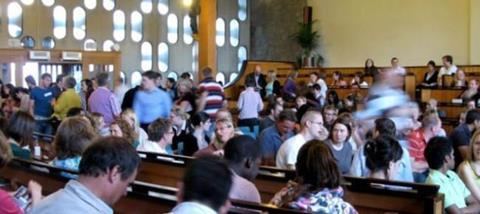
Yesterday I visited Day One of the 'Open Church' conference at Oasis Hub Waterloo. Subtitled ‘The church, sexuality, mission and the future’ the conference continues on Saturday and forms part of Steve Chalke's vision to see an 'open and honest conversation' about ‘the Church, sexuality and inclusion’.
Although Steve’s opponents have argued such a conversation has already been happening for millennia, the sold out status of the conference proves there’s an appetite for discussion around the church’s response to issues of gay marriage and LGBT rights.
The overwhelming majority of conference speakers, including Steve Chalke, believe God is in favour of monogamous same sex relationships (despite Chalke inviting some conservative voices). Most evangelicals do not share this view, but Steve believes the position is growing in popularity.
The Conversation
Steve Chalke wants a conversation. But who should be able to take part in this conversation?
'Everyone!' declares Andrew Marin. The author of Love Is An Orientation has spent years building bridges between evangelicals and LGBT communities.
But Marin questioned whether progressive Christians (who are in favour of same sex relationships) were willing to let conservative Christians (who believe homosexuality is morally wrong) join in the conversation. Given that Marin’s audience appeared to be predominantly progressive, these were brave comments to make.
Despite being continually pressed, Marin refused to give his own opinion on the morality of same sex relationships. The 33 year old has managed to maintain this position of ambiguity for all of his life. The ‘bridge-builders’ unique stance has led to both criticism and praise from fellow evangelicals and LGBT groups.
Questions such as 'Why can't gay people be cured?' and 'What does it mean to promote inclusive youth work?' were discussed during the day. There was also a debate about the phrase ‘love the sinner, hate the sin’. Most agreed the statement was unhelpful and theologically flawed. Many cannot separate their sexuality from their identity, so ‘hating the sin’ is heard and interpreted as ‘hating the person’.
Another key question was, 'How can you embrace homosexuality and still call yourself a biblical Christian?' Cameron Trimble - a lesbian vicar and CEO of The Centre for Progressive Renewal led this discussion. If anyone in the room believed homosexuality was morally wrong, they didn’t say so.
Trimble wants to ‘un-build’ the traditional position on sexuality. She says it ‘no longer works’. She even went as far to say ‘Mega churches will un-build what they have built’ and that this should be ‘celebrated’.
>‘David was a closet gay’?
There can be no doubt that many of the ideas discussed are a long way from traditional and orthodox Christian beliefs. You would imagine the claim that ‘[King] David was a closet gay’ was particularly controversial, but nobody countered the point, or objected when it was later suggested that David was bisexual (although the format of the seminars didn't much lend themselves to interruptions anyway).
Although there was room for discussion about key Bible passages (Leviticus 18, Romans 1 etc), many of the concerns raised were pastoral, rather than theological. Day 2 was scheduled to involve more focus on the biblical issues and the development of church doctrine, but this was a conference aimed at practitioners, not academics.
There was, however, a general consensus that ‘bad theology’ was responsible for hurt and pain caused to gay Christians.
As Steve Chalke wrote in the pages of Premier Christianity (Is the church failing gay Christians?, March) ‘numerous studies prove suicide rates among gay people, especially young gay people, are comparatively high’.
It is thought that Lizzie Lowe, a Christian teen who last year committed suicide at the age of 14 did so because she feared opening up about her sexuality.
Such tragic anecdotes demonstrate the seriousness of the subject at hand. Painful stories of rejection were shared openly at the conference. Tears were shed both by speakers and participants.
Time for change?
Discussions around the church, sexuality and mission were interesting, but the key area is ‘the future’. Are Christian attitudes toward sexuality changing?
Cameron Trimble argued, ‘20 years from now no one will care about gay marriage. They will care that we poisoned our planet, devastated the global middle class, and abandoned the poor.’
Would anybody advocate for the orthodox and traditional Christian position on sexuality? Steve Chalke said Tom Wright had been invited. According to Chalke, on a recent Unbelievable? episode, other conservative Christians were offered a platform too. The only person who accepted was Tony Campolo, who addressed the conference via Skype. Campolo takes the traditional position, but as Vicky Beeching later remarked, the sociologist and pastor sounded remarkably inclusive throughout his interview.
Tony observed that while some Anglican priests deny the resurrection and doubt the existence of God, many Christians want to make gay marriage the defining theological issue of today.
The primary issue for Christians, Tony Campolo argued, was never sexuality, but the poor. Issues of sexuality are clearly important. But should they be of primary concern to evangelicals? That question, like the hundreds of others raised by Open Church, continues to loom large. Questions are important. But one has to wonder if the church will ever find the answers?
If most of the speakers are to be believed, the need for a conference like Open Church will soon vanish. Maybe, but for now I can't help thinking a more vigorous debate – with a greater variety of speakers - will help evangelical Christians here and now.



























